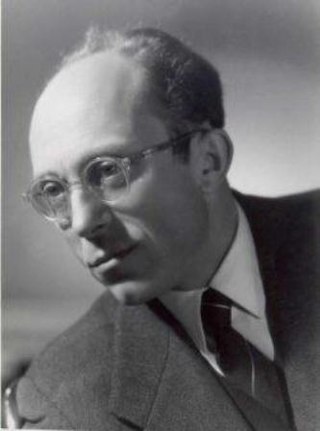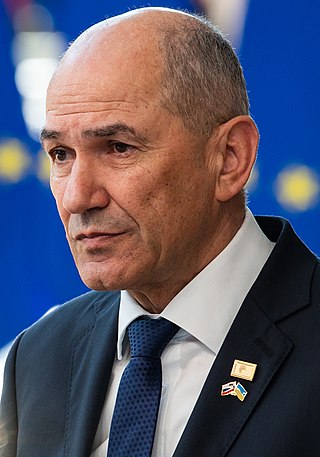
Janez Drnovšek was a Slovenian liberal politician, President of the Presidency of Yugoslavia (1989–1990), Prime Minister of Slovenia and President of Slovenia (2002–2007).

The Slovenes, also known as Slovenians, are a South Slavic ethnic group native to Slovenia, and adjacent regions in Italy, Austria and Hungary. Slovenes share a common ancestry, culture, history and speak Slovene as their native language. According to ethnic classification based on language, they are closely related to other South Slavic ethnic groups, as well as more distantly to West Slavs.

The Slovenian Democratic Party, formerly the Social Democratic Party of Slovenia, is a conservative parliamentary party; it is also one of the largest parties in Slovenia, with approximately 30,000 reported members in 2013.

Boris Pahor, OMRI was a Slovene novelist from Trieste, Italy, who was best known for his heartfelt descriptions of life as a member of the Slovenian minority in pre–Second World War increasingly fascist Italy as well as a Nazi concentration camp survivor. In his novel Necropolis he visits the Natzweiler-Struthof camp twenty years after his relocation to Dachau. Following Dachau, he was relocated three more times: to Mittelbau-Dora, to Harzungen, and finally to Bergen-Belsen, which was liberated on 15 April 1945.

Ivan Janša, baptized and best known as Janez Janša, is a Slovenian politician who served three times as a prime minister of Slovenia, a position he had held from 2004 to 2008, from 2012 to 2013, and from 2020 to 2022. Since 1993, Janša has led the Slovenian Democratic Party, which has emerged as the pre-eminent Slovenian conservative party. Janša lost his fourth bid for prime minister in April 2022, his party defeated by the Freedom Movement party.
The JBTZ trial or the JBTZ affair, also known as the Ljubljana trial or the Trial against the Four was a political trial held in a military court in Slovenia, then part of Yugoslavia in 1988. The defendants, Janez Janša, Ivan Borštner, David Tasić and Franci Zavrl, were sentenced to between six months' and four years' imprisonment for "betraying military secrets", after being involved in writing and publishing articles critical of the Yugoslav People's Army. The trial sparked great uproar in Slovenia, and was an important event for the organization and development of the liberal democratic opposition in the republic. The Committee for the Defence of Human Rights was founded on the same day of the arrest, which is generally considered as the beginning of the so-called Slovenian Spring.
The Slovenian Intelligence and Security Agency is the main civilian intelligence service of Slovenia and as a government agency is subordinated directly to the Prime Minister of Slovenia. The mission of SOVA as the central intelligence and security service in the Republic of Slovenia is to provide national security. The agency's headquarters are located at Stegne Street in Dravlje, northwest of Ljubljana's centre.

Zoran Janković is a Slovenian businessman and politician serving as Mayor of Ljubljana since April 2012. He previously served as mayor from 2006 to 2011.

Lesbian, gay, bisexual, transgender, and queer (LGBTQ) rights in Slovenia have significantly evolved over time, and are considered among the most advanced of the former communist countries. Slovenia was the first post-communist country to have legalised same-sex marriage, and anti-discrimination laws regarding sexual orientation and gender identity have existed nationwide since 2016.

Jože Pučnik was a Slovenian public intellectual, sociologist and politician. During the communist regime of Josip Broz Tito, he was one of the most outspoken Slovenian critics of dictatorship and lack of civil liberties in SFR Yugoslavia.

Slovene culture is the culture of the Slovenes, a south Slavic ethnic group. It is incredibly diverse for the country's small size, spanning the southern portion of Central Europe, being the melting pot of Slavic, Germanic and Romance cultures while encompassing parts of the Eastern Alps, the Pannonian Basin, the Balkan Peninsula and the Mediterranean.
Mladina is a Slovenian weekly left-wing political and current affairs magazine. Since the 1920s, when it was first published, it has become a voice of protest against those in power. Today, Mladina's weekly issues are distributed throughout the country. Mladina is considered one of the most influential political magazines in Slovenia.
Gradac is a village in the Municipality of Metlika in the White Carniola area of southeastern Slovenia, close to the border with Croatia on the Lahinja River. It is now included in the Southeast Slovenia Statistical Region. The village is best known for well-preserved Gradac Castle.

Brezje is a settlement in the Municipality of Radovljica in the Upper Carniola region of Slovenia. The village is located southwest of Radovljica on the road to Kranj.

Mitja Ribičič was a Slovenian and Yugoslav communist politician. He was the only Slovenian Prime Minister of Yugoslavia from 1969 to 1971.

Igor Torkar was the pen name of Boris Fakin, a Slovenian writer, playwright, and poet best known for his literary descriptions of Communist repression in Yugoslavia after World War II.
Gregor Strniša was a Slovenian poet, playwright, and songwriter. He is considered one of the most important Slovene-language poet of the second half of the 20th century. He spent most of his life away from public light, and has gained widespread recognition only after his death.
Spomenka Hribar is a Slovenian author, philosopher, sociologist, politician, columnist, and public intellectual. She was one of the most influential Slovenian intellectuals in the 1980s, and was frequently called "the First Lady of Slovenian Democratic Opposition", and "the Voice of Slovenian Spring" She is married to the Slovenian Heideggerian philosopher Tine Hribar.

Tivoli Pond is a man-made pond at the southeastern end of Tivoli City Park in Ljubljana, the capital of Slovenia. It was created in 1880. It is part of Tivoli–Rožnik Hill–Šiška Hill Landscape Park and has been used for recreation, fishing, and as a flood-control reservoir. The pond is administered by the Barje Fishing Club. It has been home to a variety of native and non-native animal species and it has served as a theme and a scene for visual artists and musicians.
There are multiple groups and organisations within Slovenia which are or have been engaged in far-right political activity, and right-wing extremism. Their political activity has traditionally opposed and targeted socially progressive policies, and minorities, and espoused traditional ultraconservative and reactionary views and values. More recently, a rise in new, incipient alt-right groups has been noted, particularly as a reaction to the European migrant crisis. While far-right actors have been responsible for multiple acts of violent extremism in Slovenia it is a relatively minor issue in the country.














